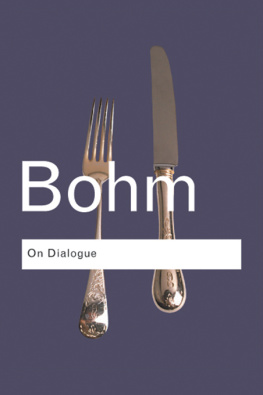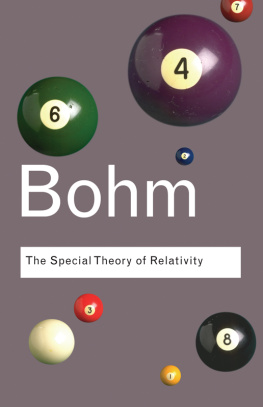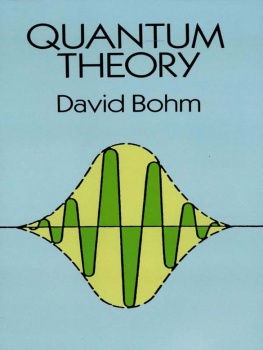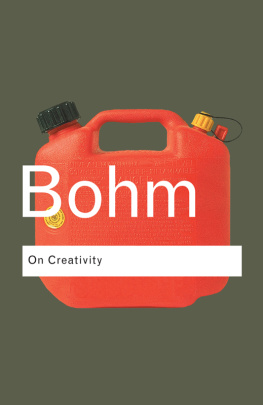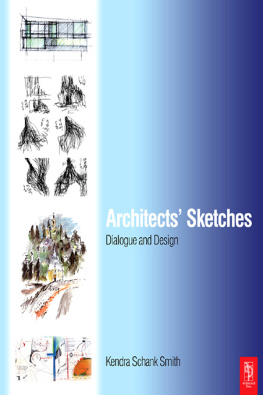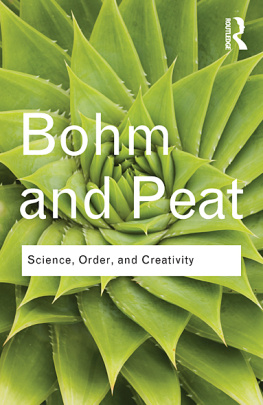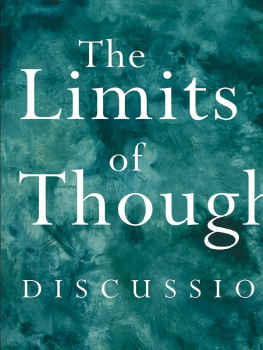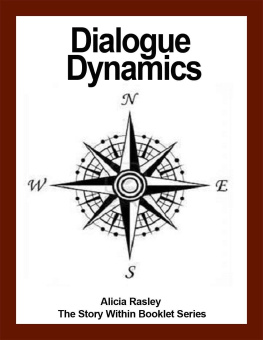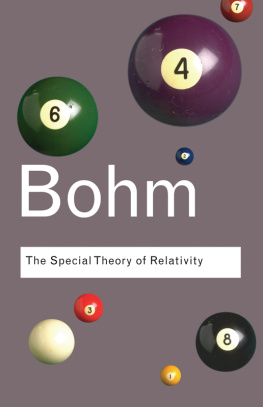
On Dialogue
People say, All we really need is love. If there were universal love, all would go well. But we dont appear to have it. So we have to find a way that works.
David Bohm, On Dialogue
One of my scientific gurus.
The Dalai Lama
Underlying many of the problems of humanity is our inability to even talk about our problems. On Dialogue offers tools that facilitate a true exchange of ideas between people.
Paavo Pylkknen
An openness to the irreducible nature of the whole in both science and art summarizes the timeless philosophical stance of David Bohm. The delight to have On Creativity and On Dialogue made into Routledge Classics has special relevance to our era of fracture, contention, and public duplicity.
Lynn Margulis, University of Massachusetts-Amherst

Routledge Classics contains the very best of Routledge publishing over the past century or so, books that have, by popular consent, become established as classics in their field. Drawing on a fantastic heritage of innovative writing published by Routledge and its associated imprints, this series makes available in attractive, affordable form some of the most important works of modern times.
For a complete list of titles visit
www.routledgeclassics.com
David Bohm
On Dialogue
With a new preface by Peter M. Senge
Edited by Lee Nichol

First published 1996
by Routledge
First published in Routledge Classics 2004
by Routledge
2 Park Square, Milton Park, Abingdon, Oxon, OX14 4RN
29 West 35th Street, New York, NY 10001
Routledge is an imprint of the Taylor & Francis Group
1996 Saral Bohm, for the original material by David Bohm; Lee Nichol for selection and editorial matter.
Preface to Routledge Classics edition 2004 Peter M. Senge
Typeset in Joanna by RefineCatch Limited, Bungay, Suffolk
Printed and bound in Great Britain by
TJ International Ltd, Padstow Cornwall
All rights reserved. No part of this book may be reprinted or reproduced or utilized in any form or by any electronic, mechanical, or other means, now known or hereafter invented, including photocopying and recording, or in any information storage or retrieval system, without permission in writing from the publishers.
British Library Cataloguing in Publication Data
A catalogue record for this book is available from the British Library
Library of Congress Cataloging in Publication Data
A catalog record for this book has been requested
ISBN 0415336414
CONTENTS
PREFACE TO THE ROUTLEDGE CLASSICS EDITION
Re-reading today David Bohms essay On Dialogue is, for me, like unwrapping a precious present. So, it was not only an honor but a wonderful opportunity to be asked to write a preface to this new edition of Bohms classic article.
I first met David and Saral Bohm at MIT in mid-1989, during the time period when the talks that were the basis for this essay were being given. We talked for several hours about dialogue. I have often wished that the meeting had been recorded, because I have the distinct recollection of hearing so much that made deep sense and knowing that I would remember little. The fine grains of Davids perceptions could not be held by the coarse weave of my mind. My feeling is that much of what was elusive to me then is laid out here and hopefully many of us are now more prepared for it.
Since that meeting, there have been many serious efforts to practice dialogue in complex settings, Within many organizations, serious efforts have been made to integrate dialogue practices into day-to-day operations for example, simple practices like check-ins and check-outs: hearing, in turn, each persons thoughts and feelings in a group at the outset or closing of meetings. In one of the worlds largest multinational corporations, a senior vice president has hosted agenda-less dialogue meetings monthly for several years, as a way of signaling the need to nurture collective leadership.
All of this signals a growing recognition that the complex problems our organizations and societies face demand a deeper listening and a more open communication than has been the norm. Win-lose politics and hierarchical authority are simply not adequate for confronting global climate change, the growing gap between rich and poor, and the dilemmas of genetic technology. People speaking at one another will not foster the mutual understanding, shared aspirations, and networks of collaborative action needed. Alternatives must be found, both within and among institutions of all sorts.
This growing interest in dialogue is why the re-publication of this talk is so timely especially if it leads to broader appreciation of what dialogue meant to Bohm and of what sorts of changes it might catalyze. For him dialogue was not just a better way to have more productive conversations, although he was supportive of this aim. It was not just a way to foster reflectiveness, which he also endorsed. It certainly was not just a method for improving the effectiveness of businesses and other mainstream organizations, a goal about which he was deeply ambivalent, because he knew that helping such organizations become more effective often meant accelerating established and problematic patterns of global industrial development.
For Bohm, the tacit ground is what holds a society together, and here is where the changes he hoped to encourage must unfold. Thought is emerging from the tacit ground, he says, and any fundamental change in thought will come from the tacit ground. Repeatedly, he stresses that a society that works requires a coherent tacit ground, and that this is missing today. Shared meaning is really the cement that holds society together, and you could say that the present society has very poor quality cement The society at large has a very incoherent set of meanings. In fact, this set of shared meanings is so incoherent that it is hard to say that they have any real meaning at all.
Appreciating what real dialogue was about for Bohm starts with appreciating what he meant by incoherence. This is an unusual term for a social critic, even less for a social activist, but a natural one for a physicist. A laser generates extraordinary energy because of the coherence of the light, which may require no more generating power than an incoherent light bulb. But, what does this analogy mean in the social world?
In his talk, Bohm often returns to the challenge in dialogue of simply allowing multiple points of view to be. Our habits are so strong to defend our view, to agree with views that correspond with our own, and to disagree with those that differ, that simply allowing diverse views to stand can be almost impossibly difficult. The thing that mostly gets in the way of dialogue, he says, is holding to assumptions and opinions, and defending them. This instinct to judge and defend, embedded in the self-defense mechanisms of our biological heritage, is the source of incoherence.
Our personal meaning starts to become incoherent when it becomes fixed. The incoherence increases when past meaning is imposed on present situations. As this continues, yesterdays meaning becomes todays dogma, often losing much of its original meaningfulness in the process. When this happens collectively, societies become governed by shadows, hollowed out myths from the past applied as inviolate truths for the present. This leads to incoherence on a large scale, patterns of thinking and acting that separate people from one another and from the larger reality in which they are attempting to live.
Next page
